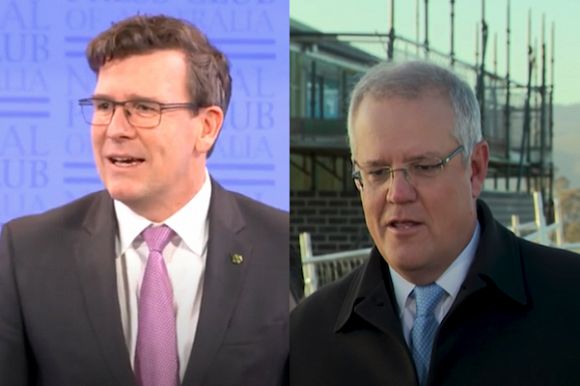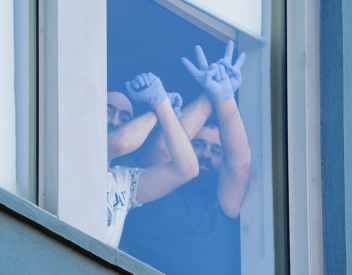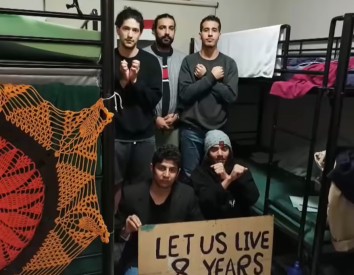The Australian Government’s revocation of Djokovic’s visa at the discretion of the immigration minister, despite a federal court ruling reinstating it, highlights the catch-22 faced by refugees and asylum seekers.
How does one receive fair treatment in a system of immigration weighed against you?
While hundreds of Djokovic’s fans chanted outside the Park Hotel last week, a preventable COVID-19 outbreak was unfolding in Sydney’s Villawood Detention Centre. At least 70 individuals have tested positive to the virus.
This marks the second preventable COVID-19 outbreak in an Australian immigration detention facility in recent months. The first, at the very hotel where Djokovic was detained, resulted in a hospitalisation and half of the detained refugees at the time tested positive to the virus.
Incredulously, the Australian Border Force (ABF) continues to assert that in both outbreaks it has followed "standard protocol" and delivered healthcare comparable to that received by the general Australian population.
This is a laughable claim in the face of the ABF’s refusal to release medically-vulnerable detainees in contravention of the advice of medical professionals, the delayed administration of COVID-19 vaccines and substandard infection control measures — these include reports of overcrowded rooms below the standard of living that made social distancing measures untenable.
In 2020, the Australian Human Rights Commission called for the release of individuals held in immigration detention during the pandemic, including in alternative places of detention (APODs) in Australia. Yet almost two years later, despite advice from refugee advocates and infection control specialists, we are facing the inevitable reality of serious adverse health outcomes inflicted on vulnerable individuals.
Some of these refugees have watched on as protests have unfolded outside the Park Hotel, Melbourne, calling for Djokovic’s release. Djokovic’s mother described his conditions of detention over four nights as "prison-like" and akin to "torture". In addition to a COVID-19 outbreak and standards of living far below expected, the remaining 32 refugees detained at the Park hotel have faced indefinite detention for nine years.
192 refugees were transferred from offshore detention in 2019 under now defunct legislation, for urgent medical assessment and 75 continue indefinite detention in APODs.
Public Interest Advocacy Centre (PIAC) reports found that many Medevac refugees are still, woefully, waiting for treatment and appropriate investigation into health signs and symptoms that precipitated their transfer. This is made more infuriating by Australia priding itself on the international stage for provision of a universal healthcare scheme.
It isn't so universal that it applies to vulnerable individuals whose self-harm, chronic pain, palpitations and signs of infection are met with denial of treatment.
Even prior to the case of Novak Djokovic, the discretionary ministerial powers that wield absolute authority over granting or revoking visas have been called into question. Under the Migration Act 1958 (Cth), the minister can act in what is broadly defined as the "public interest".
In 2018, then-Immigration Minister Peter Dutton granted visas to four au pairs facing deportation. A Senate inquiry into the Minister’s decision claimed he had misled Parliament, given his connection to the family who employed one au pair.
Dutton’s public response was:
"…as a discretionary and humanitarian act to an individual with ongoing needs, it is in the interests of Australia as a humane and generous society to grant this person a tourist visa."
This statement, in the face of the treatment of the Murugappan family based in Biloela, is bewilderingly inconsistent. Despite having lived and worked in the community of Biloela in rural Queensland, and having two Australian-born children, the Sri Lankan family of four have suffered years of detention in various immigration detention facilities including Christmas Island.
They have been engaged in a long struggle to reinstate their asylum status, resulting in the hospitalisation of their four-year-old child due to untreated pneumonia in detention. Immigration Minister Alex Hawke has seemingly not seen fit to exercise any ministerial authority here other than to grant three month bridging visas to all but the youngest four-year-old member of the family, despite national and community campaigns to release them.
Djokovic’s experience at the hands of ABF officials at Melbourne Airport included reports he was held and questioned throughout the night without the ability to communicate with his lawyers or seek further advice until the morning; the ABF then made the decision to cancel his visa before he was allowed to do so.
Regardless of claims of superstar entitlement, if this is what an international sports star with a legal team at his disposal is subjected to, one can only imagine the plight of refugees and asylum seekers pitted against the might of the ABF and Australia's immigration policies.
Scott Morrison’s statement about Djokovic’s visa cancellation, maintaining that "rules are rules" rings hollow, with many arguing it is part of a sensationalist election tactic to distract from his Government’s handling of the Omicron outbreak. This is reminiscent of the pre-election claims then-Prime Minister John Howard made in 2001 following his Administration’s refusal to allow the Norwegian freighter MV Tampa holding 433 rescued refugees to enter Australian waters.
He infamously stated:
"I believe it is in Australia’s national interest that we draw a line on what is increasingly becoming an uncontrollable number of illegal arrivals in this country."
At the same time, he abominably announced that refugees had thrown their children overboard, a since discredited part of election propaganda. It underlines a deceptive (and bipartisan) political strategy over the past 20 years; propagating an image of tough borders they have demonised refugees and asylum seekers in the eyes of the Australian voter, condemning more than 4,000 individuals to indefinite detention in what has been described as "Pacific concentration camps" since the commencement of offshore processing almost nine years ago.
Consecutive Australian governments have steadfastly continued to disregard their obligations under the 1951 Refugee Convention.
What is the identity of the Australian voting public that allow our government to indefinitely torture refugees and asylum seekers? Have we become so indifferent that we are at best ignorant and at worst willing to accept a policy that perpetuates human suffering?
As Djokovic’s supporters will likely continue their protests, more than 200 individuals remain in offshore detention on Manus Island and Nauru. There are grave concerns over those in Papua New Guinea following the end of the Australian Government’s detention agreement with the Pacific nation.
Almost 1,500 individuals remain in immigration detention facilities onshore at the whim of ABF and their contracted companies.
The logic, or lack thereof, underpinning our inhumane policies of immigration detention and the unchecked powers granted to the Australian Government and Immigration Minister to enforce them remain in force because of the apathy of the Australian people.
And heading into an election year, only we can stop them.
Dr Nilanthy Vigneswaran is an Infectious Diseases doctor, based in Darwin.
Related Articles
- Detained refugees denied access to library services
- Federal Government prevents medical community from assisting refugees
- Fire, floods and felonies: Relocation the only option for Rohingya
- Refugees defenceless against politics of cruelty
- Selling Australia's offshore detention regime to the world
 This work is licensed under a Creative Commons Attribution-NonCommercial-NoDerivs 3.0 Australia License
This work is licensed under a Creative Commons Attribution-NonCommercial-NoDerivs 3.0 Australia License
Support independent journalism Subscribe to IA.















